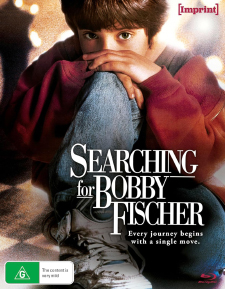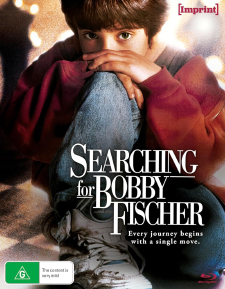Searching for Bobby Fischer (Blu-ray Review)

Director
Steven ZaillianRelease Date(s)
1993 (August 30, 2023)Studio(s)
Paramount Pictures (Imprint/Via Vision)- Film/Program Grade: B+
- Video Grade: A-
- Audio Grade: A
- Extras Grade: B+
Review
Similar in many ways to Jodie Foster’s Little Man Tate (1991), Searching for Bobby Fischer (1993) likewise is about a child prodigy whose great talents create problems for both the child and his parents. In this case, the boy is Josh Waitzkin, a real-life chess prodigy at age seven, the role played by Max Pomeranc, himself not a child actor but also a Top 20 chess player in his age bracket. He was cast to add verisimilitude to the many scenes of him playing chess, but he also delivers a fine performance.
The film is based on the book Searching for Bobby Fischer: The Father of a Prodigy Observes the World of Chess, written by Fred Waitzkin, Josh’s father, played in the film by Joe Mantegna. As the film opens, Josh has a loving relationship with his parents, including Bonnie (Joan Allen), his mother. Josh is very active in a variety of sports but becomes fascinated watching the chess players—some drug addicts hustling games to buy their dope—in New York City’s Washington Square Park. Josh begins studying the game on his own, quickly learning to effortlessly beat his father.
Impressed, Fred takes Josh to meet Bruce Pandolfini (Ben Kingsley), one of the all-time great teachers. Pandolfini quickly recognizes Josh’s great gift, that Josh is a possible heir to the game’s most famous player, the mysterious, elusive Bobby Fischer. Pandolfini tries to teach Josh discipline, to dissuade him from bringing out his Queen too early, and that the fast games in Washington Square are showy but limit one’s fuller understanding of the game. Fred, meanwhile, is anxious to show Josh off in a series of tournaments with other highly-ranked child players.
The film was critically lauded but financially not successful. It’s admirably humanist, getting into the minds of sweet, innocent children corrupted by the ambitions of flawed parents and obsessive teachers. Fred genuinely loves Josh, but temporarily loses sight of the things most important in his relationship with his son. Pandolfini, meanwhile, in wanting Josh to become more competitive, threatens to harden the heart of a basically innocent little boy who, because of his nurturing family, truly doesn’t want to hate anybody, even his opponents across the chess table.
In this sense, I found it a little hard to relate to some of the film’s plot developments. I’ve personally never been particularly enamored of competitive games and sports, or claim to understand the drive to push one’s self or others to the limits of obsessively needing to be the very best at something. I can’t imagine pushing my (now teenage) daughter in the ways Fred and Pandolfini do. Josh enjoys playing chess in the same way he likes playing Monopoly or Operation with his kid sister. He wants everyone to have fun.
The film is mostly good with a peerless cast, including some actors soon to become much better-known: Laurence Fishburne as Vinnie, a street player based on several real-life players; David Paymer, William H. Macy, and Anthony Heald as fathers of other prodigies; Laura Linney as Josh’s school teacher, Tony Shalhoub, Josh Mostel, and Vasek Simek as chess celebrities. Many real-life chess masters appear in cameo roles, as do the real Josh and most of his family, as well as Pandolfini (who is nothing like Kingsley’s portrayal).
The film errs badly in the casting of Josh’s arch-rival, Jonathan Poe (Michael Nirenberg), with a child actor who resembles one of the bratty kids touring Willy Wonka’s chocolate factory. Though mentally scalded by an ultra-controlling teacher (Robert Stephens, in one of his last roles), the perpetually scowling, unhappy lad is set up as an unlikeable opponent (for the audience), to give the film a Rocky-like climax. Likewise, James Horner’s musical score, excellent in its own way, is melodramatic, too often telling the audience how to feel at any given moment. While the film’s screenplay is not unlike European dramatic films, they’d certainly refrain from such sappy manipulation.
Imprint’s Region-Free Blu-ray presents the 1.85:1 widescreen release in 1.78:1 full-screen, which looks just fine. The video transfer has been criticized in some quarters, but given how awful 35 mm prints of Hollywood films in wide release looked back in the day of 6,000 print runs, I was generally pleased with the sharpness, color, contrast, etc. Better, though, are the DTS-HD 5.1 and LPCM 2.0 tracks, which really come alive and, for a small little film, use the surround channels well. Optional English subtitles provided.
Extras include a (repurposed?) audio commentary track by writer Scott Harrison; a 22-minute featurette on composer James Horner called Maybe It’s Better Not to Win; and archival press junket-type video interviews with director Steven Zaillian, Kingsley, Allen, Fishburne, the real Bruce Pandolfini, and both Pomeranc and the real Josh Watzkin. This last feature amounts to about 35 minutes of material.
Searching for Bobby Fischer is an admirably ambitious, humanist film that fails in some ways but also succeeds in others, with enough of the latter to make it worth a look, and the subject matter, based on a true story, is fascinating.
- Stuart Galbraith IV

